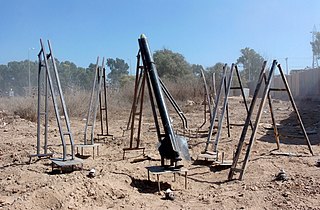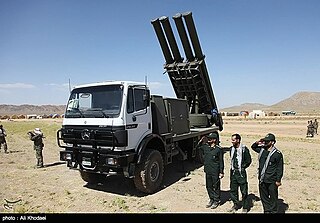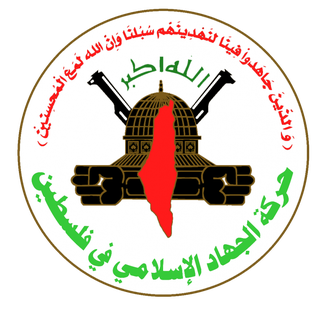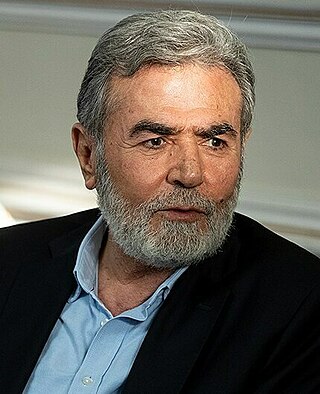
The Qassam rocket is a simple, steel artillery rocket developed and deployed by the Izz ad-Din al-Qassam Brigades, the military arm of Hamas. These rockets cannot be fired to target specific military objectives in or near civilian areas, and are "indiscriminate when used against targets in population centers".

Al-Quds Brigades is a paramilitary organisation and the armed wing of the Palestinian Islamist organization Palestinian Islamic Jihad (PIJ), which is the second largest group in the Gaza Strip, after Hamas. AQB's leader is Ziyad al-Nakhalah, based in Damascus, Syria. The head of AQB in the Gaza Strip was Baha Abu al-Ata until he was killed in November 2019.

The Fajr-5 is an Iranian 333 mm long-range multiple launch rocket system (MLRS). The Fajr-5 was developed during the 1990s and has since been exported to various armed actors in the Middle East.
Even before the outbreak of the Al-Aqsa Intifada, various insurgent Palestinian groups built domestically-produced weapons for attacks against Israel. Most of the effort has been in the production of unguided artillery rockets, though Hamas has built its own versions of anti-tank missiles and rocket-propelled grenades (RPGs). Though usually smuggled across the Egyptian border into the Gaza Strip and to a lesser extent Jordanian border into the West Bank, various small arms are believed to be produced in the Palestinian territories.
This is the Timeline of the Israeli–Palestinian conflict in 2007.

The Islamic Jihad Movement in Palestine, commonly known simply as Palestinian Islamic Jihad (PIJ), is a Palestinian Islamist paramilitary organization formed in 1981.

Since 2001, Palestinian militants have launched tens of thousands of rocket and mortar attacks on Israel from the Gaza Strip as part of the continuing Israeli–Palestinian conflict. The attacks, widely condemned for targeting civilians, have been described as terrorism by the United Nations, the European Union, and Israeli officials, and are defined as war crimes by human rights groups Amnesty International and Human Rights Watch. The international community considers indiscriminate attacks on civilian targets to be illegal under international law. Palestinian militants say rocket attacks are a response to Israel's blockade of Gaza, but the Palestinian Authority has condemned them and says rocket attacks undermine peace.

The Palestinian rocket arsenal used in the Arab–Israeli conflict includes a wide range of rockets and missiles, varying in design, size and payload capacity. Palestinian rockets include those locally made in Gaza and the West Bank as well as weapons smuggled from Iran and Syria. Rockets are used in attacks on Israel, mostly to target Israeli civilian centers in addition to Israeli military posts. Various Palestinian groups have used rockets against Israel including Fatah, Hamas, Islamic Jihad, as well as left-wing groups. Rockets are one of the main weapons produced by Palestinian militant and terrorist groups.

The Sabireen Movement, officially the Movement of the Patient ones in Support for Palestine– Hisn, was a Shiite Palestinian militant group that operated from 15 May 2014 to March 2019.

Ziyad al-Nakhalah is a Palestinian politician who is the leader of the Palestinian Islamic Jihad (PIJ).

A Gaza–Israel conflict escalation began on 3 May 2019 after two Israeli soldiers were injured by sniper fire from the Gaza Strip during the weekly protests at the Gaza–Israel border. In response, the Israeli Air Force carried out an airstrike, killing two Palestinians. Following this, hundreds of rockets were launched from Gaza at Israel, while the Israeli Air Force struck numerous targets within the Gaza Strip. In addition, Israel increased its troop presence near the Israel–Gaza barrier.
Baha Abu al-Ata was a leader of Islamic Jihad Movement in Palestine (PIJ). On 12 November 2019, the Israeli Defence Forces (IDF) killed Abu al-Ata and his wife in a targeted killing, four of their children and a neighbour were also reportedly injured. The killings triggered clashes between Israelis and Palestinians. Khalil Bathani became the new leader of PIJ.

The Gaza–Israel clashes code-named by Israel as Operation Black Belt, took place between the Israel Defense Forces (IDF) and Palestinian Islamic Jihad (PIJ) following the targeted killing of senior PIJ commander Baha Abu al-Ata in Gaza, and the attempted killing of senior PIJ commander Akram al-Ajouri in Damascus, Syria by the IDF. PIJ responded with rocket fire into Israel, including long-range rockets fired towards Tel Aviv, leading to several civilians being wounded. In response to the rocket fire, Israel carried out airstrikes and artillery shelling in the Gaza Strip, killing and wounding several militants as well as civilians.

The 2022 Gaza–Israel clashes code-named as Operation Breaking Dawn lasted from 5 to 7 August 2022. The Israel Defense Forces (IDF) conducted some 147 airstrikes in Gaza and Palestinian militants fired approximately 1,100 rockets towards Israel. The operation, ordered by Prime Minister Yair Lapid and Defense Minister Benny Gantz without prior Cabinet discussion or approval, followed a raid in Jenin in the Israeli-occupied West Bank, in which Israeli forces arrested Bassam al-Saadi, a leader of the Palestinian Islamic Jihad (PIJ) in that area. On 6 August, Israel arrested 20 people in the West Bank of whom 19 were members of PIJ and a further 20 on 7 August according to an unnamed Israeli official.
Tayseer Mahmoud al-Jabari was a Palestinian militant and senior commander of the al-Quds Brigades, the military wing of the Palestinian Islamic Jihad (PIJ) movement. He succeeded Baha Abu al-Ata as the brigades' commander in the northern Gaza Strip, holding that position from the former's assassination in 2019 until his own assassination in 2022, which sparked the 2022 Gaza–Israel clashes.

The Islamic Republic of Iran is a key patron of the Palestinian militant organization Hamas, which has controlled the Gaza Strip since 2006. Iran provides Hamas with funds, weapons, and training.











